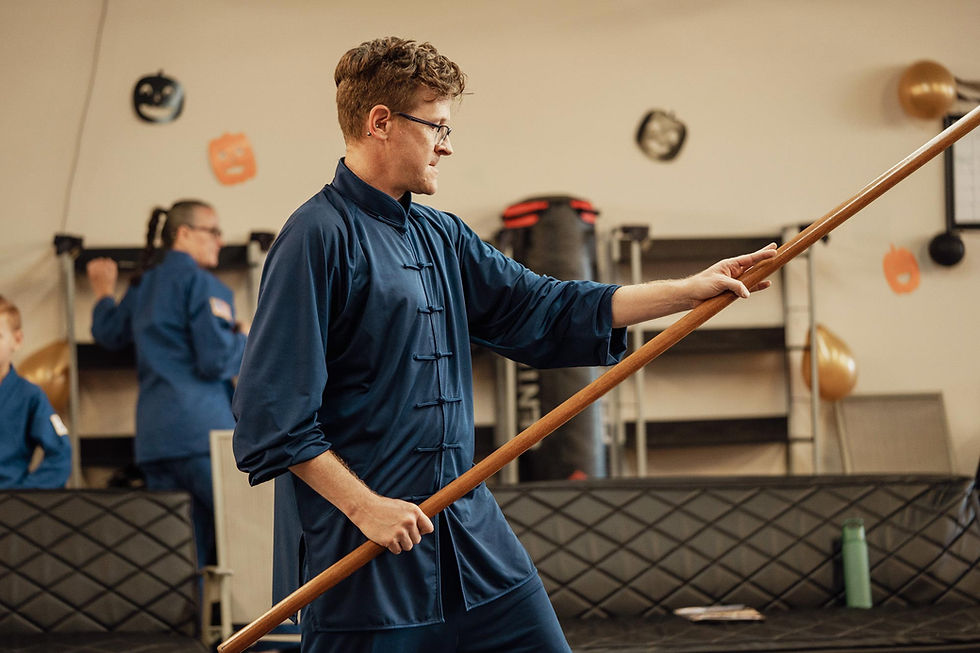What is Tai Chi?
- Jul 25, 2025
- 3 min read
What is Tai Chi?

Tai Chi, also known as Tai Chi Chuan, is a traditional Chinese martial art that has its origins deeply embedded in the rich tapestry of Chinese culture and philosophy. This ancient practice is not merely a form of physical exercise; it is a comprehensive system that seamlessly integrates gentle physical movements, stretching, mindfulness, and meditation into a cohesive practice. The essence of Tai Chi is encapsulated in its slow, flowing movements, which are often described by practitioners and enthusiasts alike as "meditation in motion." This unique characteristic allows individuals to cultivate a sense of inner peace while engaging in physical activity.
The roots of Tai Chi can be traced back to the 13th century, where it was developed as a martial art focused on self-defense techniques. Over the centuries, it has evolved into a practice that is widely recognized for its health benefits, self-defense capabilities, and contributions to spiritual growth and self-awareness. Tai Chi is grounded in the principles of Traditional Chinese Medicine and the philosophical concepts of Yin and Yang, emphasizing balance, harmony, and the flow of energy, or "Qi," within the body. Practitioners often find that Tai Chi not only enhances their physical health but also fosters a deeper connection to their inner selves, promoting a holistic approach to well-being.

Benefits of Tai Chi
Improved Balance: Regular practice of Tai Chi enhances stability and coordination, making it particularly beneficial for older adults who are at a higher risk of falls. The gentle movements and postures help to strengthen the muscles and improve proprioception, which is the body’s ability to sense its position in space.
Increased Flexibility: The slow, deliberate movements of Tai Chi promote greater range of motion in joints and muscles. This increased flexibility can lead to improved athletic performance and a reduction in the risk of injuries during other physical activities.
Stress Reduction: Tai Chi encourages relaxation and helps to lower stress levels through mindful breathing and movement. The practice serves as a form of moving meditation, allowing individuals to release tension and cultivate a sense of tranquility amidst the chaos of daily life.
Enhanced Mental Clarity: The focus required during Tai Chi practice can significantly improve concentration and cognitive function. Engaging in the intricate movements and sequences sharpens mental acuity, which can be particularly beneficial for individuals seeking to enhance their mental performance.
Better Posture: Tai Chi promotes awareness of body alignment and posture, leading to improved overall body mechanics. As practitioners become more attuned to their bodies, they often find that their posture improves both during practice and in their daily lives, reducing strain and discomfort.
Pain Relief: Many practitioners report experiencing reduced chronic pain conditions, including arthritis, back pain, and fibromyalgia. The gentle movements and focus on relaxation can help alleviate tension in the body and improve overall comfort.
Cardiovascular Health: Regular practice of Tai Chi can improve heart health and circulation, contributing to overall physical fitness. The low-impact nature of the exercises makes it a suitable form of cardiovascular exercise for individuals of all ages.
Emotional Well-being: The meditative aspects of Tai Chi can enhance mood and promote a sense of well-being. Engaging in this practice can lead to reductions in anxiety and depression, fostering a more positive outlook on life.
Conclusion
Tai Chi is a holistic practice that offers a plethora of physical, mental, and emotional benefits. Its gentle approach makes it accessible to people of all ages and fitness levels, allowing individuals to engage with the practice at their own pace. Whether one is seeking to improve balance, enhance flexibility, reduce stress, or cultivate a deeper sense of inner peace, Tai Chi serves as a valuable addition to a healthy lifestyle. As more people discover the transformative effects of this ancient art, it continues to grow in popularity around the world, bridging the gap between traditional practices and modern wellness. Embracing Tai Chi can lead to a more balanced, harmonious life, where the mind, body, and spirit work together in unison.




Comments